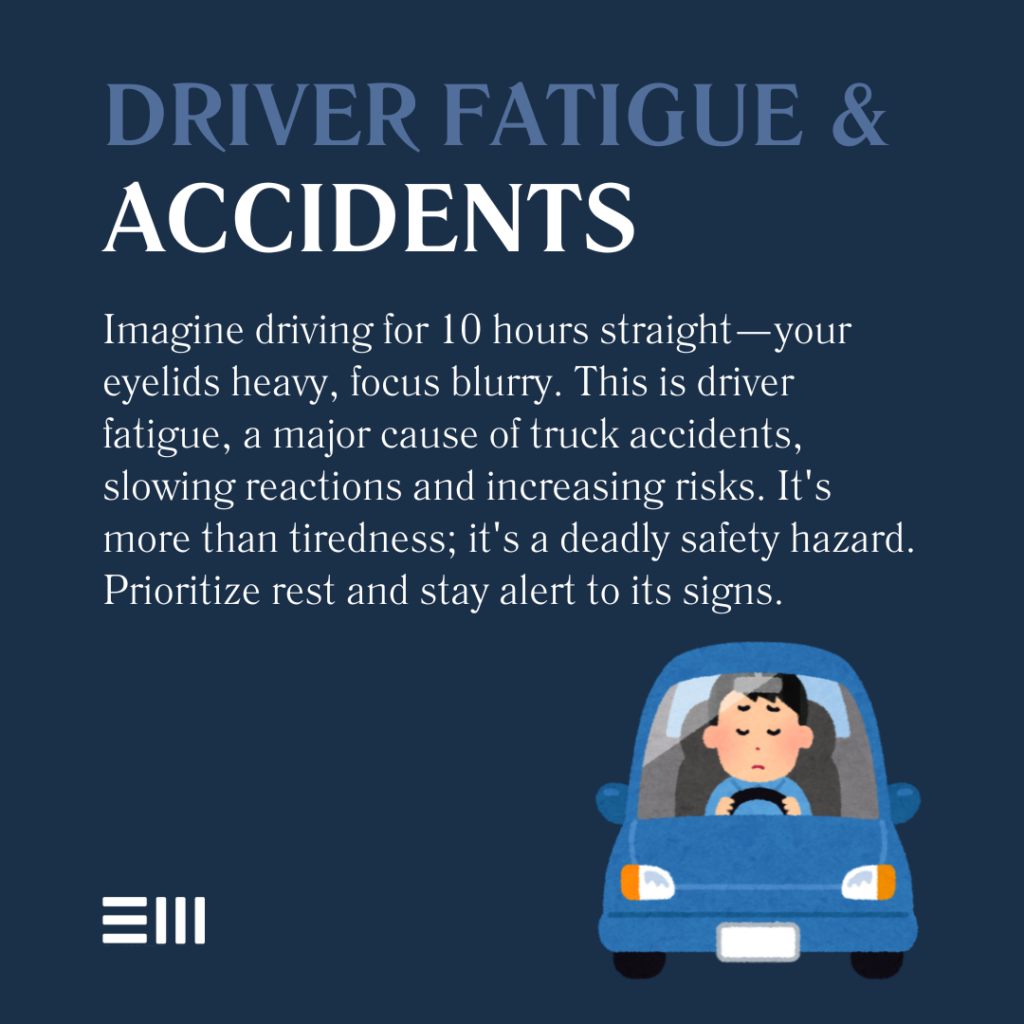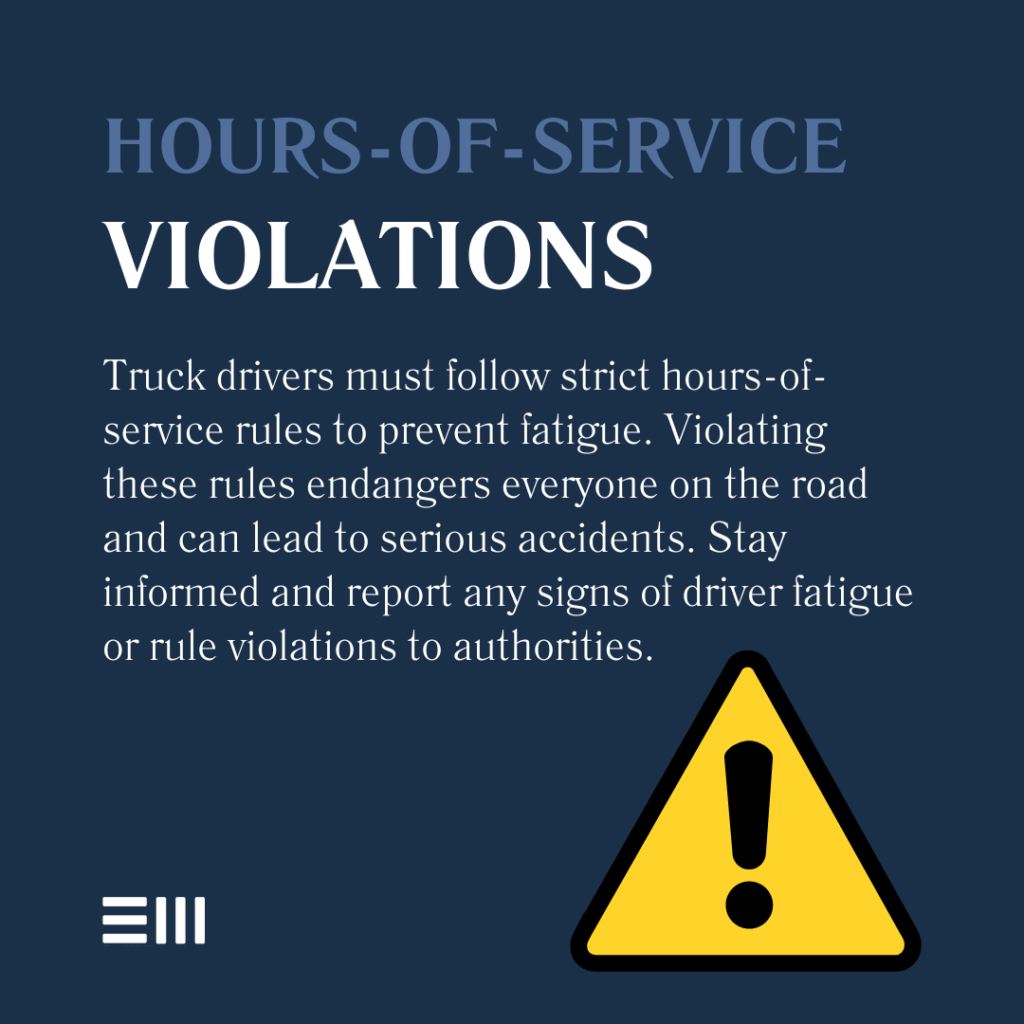
Imagine a 40-ton behemoth barreling down I-65 at 70 miles per hour. Now imagine the driver of that truck hasn’t slept in 24 hours. This scenario isn’t just a hypothetical—it’s a very real danger on Alabama’s roads.
According to the National Highway Traffic Safety Administration, drowsy driving claimed 633 lives in a single year.
What if you found yourself sharing the road with a sleep-deprived truck driver? Would you know what to do? Or what if you or a loved one had already fallen victim to such a tragic accident?
This comprehensive guide delves into the critical issue of truck accidents caused by driver fatigue and hours-of-service violations in Alabama.
The Scope of the Problem
Truck accidents caused by driver fatigue and hours-of-service violations are a serious issue in Alabama and across the United States.
According to the Federal Motor Carrier Safety Administration (FMCSA), fatigue is a contributing factor in approximately 13% of all commercial motor vehicle crashes.
In Alabama, with its extensive network of highways and interstates, the risk of such accidents is particularly high.
Understanding Driver Fatigue
Driver fatigue is a state of physical or mental exhaustion that impairs a person’s ability to operate a vehicle safely.
For truck drivers, who often work long hours and cover vast distances, fatigue can be a constant challenge.
Some key points to understand about driver fatigue include:
- Causes: Long hours on the road, irregular sleep patterns, stress, and poor diet can all contribute to driver fatigue.
- Signs: Yawning, heavy eyelids, drifting between lanes, and difficulty focusing are common signs of fatigue.
- Effects: Fatigue can impair judgment, slow reaction times, and reduce awareness of surroundings, making it as dangerous as driving under the influence of alcohol.
Recognizing these aspects of driver fatigue is crucial for both truck drivers and other motorists to ensure safety on Alabama’s roads.

Hours-of-Service Regulations
To combat driver fatigue, the FMCSA has established Hours-of-Service (HOS) regulations.
These rules limit the number of hours a commercial driver can operate a vehicle. Key aspects of these regulations include:
- 11-Hour Driving Limit: Drivers may drive a maximum of 11 hours after 10 consecutive hours off duty.
- 14-Hour Limit: Drivers may not drive beyond the 14th consecutive hour after coming on duty, following 10 consecutive hours off duty.
- Rest Breaks: Drivers must take a 30-minute break when they have driven for a period of 8 cumulative hours without at least a 30-minute interruption.
- 60/70-Hour Limit: Drivers may not drive after 60/70 hours on duty in 7/8 consecutive days.
These regulations form the backbone of efforts to prevent fatigue-related accidents, but their effectiveness relies on strict adherence by both drivers and trucking companies.

Common Violations and Their Consequences
Despite these regulations, violations do occur. Common HOS violations include:
- Falsifying logbook entries;
- Exceeding daily driving limits;
- Insufficient off-duty time; and
- Failure to take required rest breaks.
The consequences of these violations can be severe, ranging from fines and penalties to increased accident risk and potential loss of life.
The Impact on Road Safety in Alabama
Alabama’s position as a crucial transportation hub means that truck traffic is a constant presence on its roads.
The state’s Department of Transportation reports that commercial vehicles are involved in a disproportionate number of fatal crashes compared to their representation on the road.
Fatigue and HOS violations contribute significantly to this statistic.
Legal Implications for Trucking Companies and Drivers
When accidents occur due to fatigue or HOS violations, both the driver and the trucking company may be held liable.
In Alabama, this can lead to:
- Civil Penalties: Fines and sanctions imposed by regulatory bodies;
- Criminal Charges: In cases of severe negligence or repeat offenses;
- Civil Lawsuits: Victims of accidents may seek compensation for damages; and
- Loss of Operating Authority: Trucking companies may lose their right to operate.
These potential consequences underscore the importance of compliance with safety regulations and the serious legal risks associated with violations.
Steps to Take If You’re Involved in a Truck Accident
If you find yourself involved in a truck accident in Alabama, follow these steps:
- Ensure your safety and the safety of others;
- Call 911 and report the accident;
- Seek medical attention, even if injuries seem minor;
- Document the scene with photos and gather witness information;
- Do not admit fault or make statements to insurance companies; and
- Contact an experienced truck accident attorney.
Taking these steps can protect your health, rights, and potential legal claim in the aftermath of a truck accident.
Preventing Fatigue-Related Accidents
While regulations play a crucial role, prevention is key. Trucking companies and drivers can take proactive steps:
- Implement Fatigue Management Programs: Education and training on recognizing and managing fatigue
- Use Technology: Electronic logging devices (ELDs) to accurately track hours
- Encourage a Safety Culture: Prioritize rest and compliance over meeting deadlines
- Regular Health Check-ups: Identify and address underlying health issues that may contribute to fatigue
By implementing these preventive measures, the trucking industry can significantly reduce the risk of fatigue-related accidents, creating safer roads for everyone in Alabama.
Frequently Asked Questions
To address some common concerns about truck accidents related to driver fatigue and hours-of-service violations in Alabama, we’ve compiled the following frequently asked questions.
How Common Are Truck Accidents Caused by Fatigue in Alabama?
While exact statistics for Alabama are not readily available, national data suggests that fatigue is a factor in about 13% of truck accidents. Given Alabama’s significant trucking industry presence, it’s likely that the state’s numbers are comparable to or higher than the national average.
What Should I Do If I Suspect a Truck Driver Is Operating While Fatigued?
If you observe a truck driver showing signs of fatigue (such as erratic driving), maintain a safe distance and contact local law enforcement or the Alabama State Troopers. Provide them with your location, a description of the truck, and the behavior you’ve observed.
Can Trucking Companies Be Held Responsible for Accidents Caused by Driver Fatigue?
Yes, trucking companies can be held liable if they’ve encouraged or allowed drivers to violate HOS regulations, failed to implement proper fatigue management programs, or neglected to maintain their vehicles properly.
How Long Do I Have to File a Lawsuit After a Truck Accident in Alabama?
In Alabama, the statute of limitations for personal injury claims, including those from truck accidents, is generally two years from the date of the accident. However, it’s advisable to consult with an attorney as soon as possible to ensure your rights are protected.
Are There Different HOS Rules for Different Types of Commercial Vehicles?
Yes, the FMCSA has different HOS rules for property-carrying drivers and passenger-carrying drivers. Additionally, there are exceptions for certain types of operations, such as short-haul drivers or drivers in adverse driving conditions.
How Can I Prove That Driver Fatigue or HOS Violations Caused My Accident?
Proving fatigue or HOS violations often requires a thorough investigation. Evidence may include the driver’s logbooks, electronic logging device data, the truck’s black box data, witness testimonies, and expert analysis of the accident scene.
Fight Harder, Fight Smarter
If you’ve been involved in a truck accident in Alabama where driver fatigue or hours-of-service violations may have played a role, it’s crucial to seek experienced legal representation.
An attorney specializing in truck accidents can help you navigate the complex legal landscape, ensure your rights are protected, and pursue fair compensation for your injuries and losses.
Remember, trucking companies and their insurers often have teams of lawyers working to minimize their liability. Having a knowledgeable advocate on your side can level the playing field and increase your chances of a favorable outcome.
Contact Baxley Maniscalco today for a free consultation to discuss your case. We have a dedicated team of attorneys experienced in handling truck accident cases in Alabama, ready to work tirelessly to get you the justice and compensation you deserve.
Can't find what you're looking for? Search our site below.










